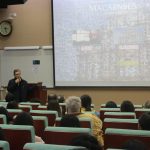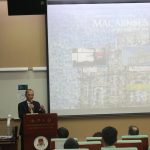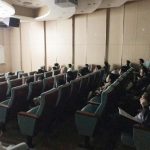 Mario Nunes addresses the audience
Mario Nunes addresses the audience
The University of Macau (UM) Department of Portuguese held the premiere of the documentary An Odyssey / part 1. The event was jointly organised by the department’s Research Centre for Luso-Asian Studies and the International Institute of Macau (IIM). Produced by the IIM, the video documents immigration flows triggered by political, economic, and social factors following the Opium Wars and the signing of the Treaty of Nanking in 1842, with a focus on the migration of the Macanese Portuguese community to Hong Kong, Shanghai and other treaty ports. The documentary specifically narrates the stories of those who, during the outbreak of the Second World War and the Japanese invasion of Shanghai and Hong Kong, returned to Macao as refugees. Most of the documentary is based on interviews conducted in North America with senior members of the last generation who were born in those ports. In the video, they share their experiences as refugees during that time.
The documentary is a valuable record of events that shaped the course of Chinese history, and consequently the history of Macao. Viewers can learn from firsthand accounts what it was like to live as a refugee in Macao during the Second World War. It can also increase students’ knowledge of this piece of history related to Macao and China, as well as the Macanese Portuguese community.
Rufino Ramos, secretary-general of the IIM, and Dr Mário Nunes from the Department of Portuguese, talked briefly about the video in Portuguese. The event was also attended by Dr Vong Iat Hang, a representative of the Education and Youth Affaires Bureau; Prof Dora Maria Nunes Gago, deputy head of the Department of Portuguese; and Jorge Valente, president of the Macanese Youth Association.




